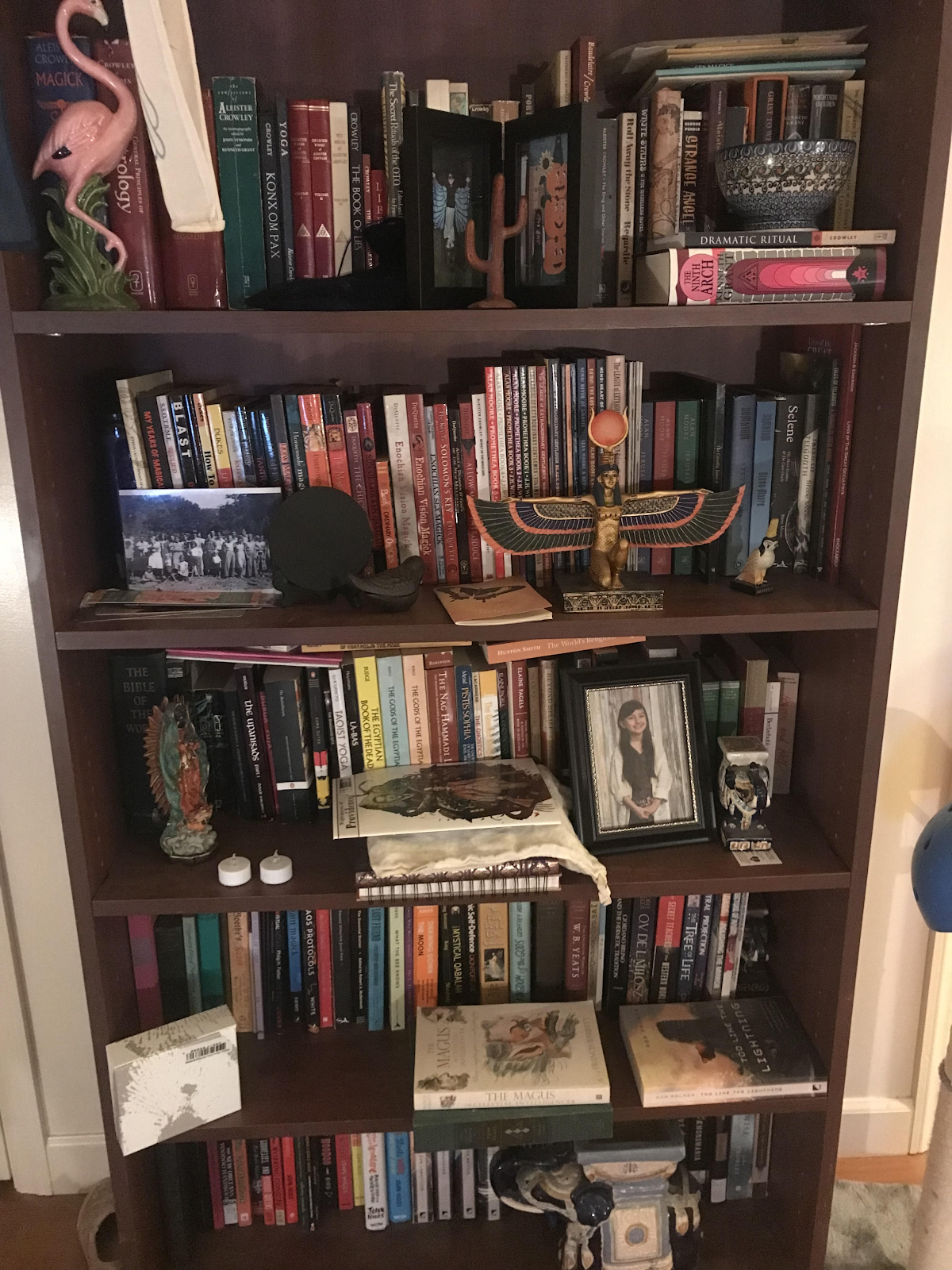Our friend Spookah asked: Apuleius, I feel curious, which other books would you consider “essential reading for anyone interested in magic”?
This is the kind of question I hope and live for.
How Can Anyone Believe This Shit?
- "Magic, Running Through the Gutters Like Lightning" by Alan Moore (Dodgem Logic #3)
- SSOTBME by Ramsey Dukes
- The Illuminatus! Trilogy by Robert Shea and Robert Anton Wilson (See "Appendix Lamed")
- Prometheus Rising by Robert Anton Wilson
- Promethea (disowned by Alan Moore)
- What The Bee Knows by P.L. Travers
- The Living Qabalah by Will Parfitt
- Liber E and Liber O, 777, Konx Om Pax by Crowley
- At least two different biographies of Crowley and Blake (or whichever magicians you choose) (I recommend Crowley's Autohagiography and Regardie's Eye in the Triangle as well as Gilchrist's original biography with Peter Ackroyd's. I would revise the latter to Higg's Blake vs. the World nowadays.)
Practical Magic (You Already Know It)
- While unpublished as of yet, The Bumper Book of Magic by Alan Moore and Steve Moore (along with a slew of incredibly talented artists)
- Jerusalem by Alan Moore
- "The Moon and Serpent Grand Egyptian Theatre of Marvels" in Kaos 14 by Alan Moore and Steve Moore
- Somnium, Selene by Steve Moore
- The Grand Egyptian Theatre of Marvels, The Highbury Working, Snakes & Ladders and Angel Passage by The Grand Egyptian Theatre of Marvels
- "Unearthing" by Alan Moore in London: City of Disappearances edited by Ian Sinclair
- The League of Extraordinary Gentlemen by Alan Moore and Kevin O'Neil
- Moonchild, The Equinox, The Book of Lies, Eight Lectures On Yoga, The Book of Thoth and Liber ABA by Crowley (really, just read everything by Crowley)
- Ishtar Rising, Sex, Drugs & Magick, Masks of the Illuminati and Schrodinger's Cat Triolgy (read the original three separate books) by Wilson (really, just read everything...)
- The Complete Works of William Blake (O'Neill)
- How To See Fairies, Blast Your Way To Megabucks, and My Years of Magical Thinking by Ramsey Dukes
- Mules and Men and Tell My Horse by Zora Neale Hurston
- Ulysses and Finnegans Wake by James Joyce
- The Magic of Psychosynthesis by Will Parfitt
- Tantra: The Way of Action by Francis King
- Austin Osman Spare by Phil Baker
- The Book of Pleasure by Austin Osman Spare
- the Maybe Logic courses of Lon Milo Duquette (it wouldn't hurt to read everything by, and helps a lot, to read everything by Lon Milo Duquette.)
Some Discretion Needed (This Applies to Everything On This List: There Are No Categories, Anywhere)
- The Magical Revival by Kenneth Grant
- The Dedalus Book of the Occult and Turn Off Your Mind by Gary Lachman
- Journey to Ixtlan, Tales of Power, and The Fire From Within by Carlos Castaneda
- Sex Magick by Louis T. Culling
- anything you can get your paws on
 |
| A bookshelf in my home that houses a part of my occult library. |

Fantastic post, thank you very much for this great ressource!
ReplyDeleteEven though I guess "anything you can get your paws on" should be the main thing to remember here, it's great to see what influenced you personally.
Are the lack of Peter J. Carroll or Gurdjieff simple omissions, or do you not click much with them?
I liked SSOTBME and really enjoyed the Hilaritas podcast with Ramsey Dukes, feeling very much compelled to delve deeper into his work. The next one should be the Little Book of Demons that you once recommended.
Great list! I recently got blown away again by how much magick instruction appears in Masks of the Illuminati by RAW.
ReplyDelete@Spookah: Yeah, reading widely and voraciously is the best way forward. I guess Gurdjieff is a simple omission...while I like Beezlebub's Tales to His Grandson, Meetings With Remarkable Men, not to mention the works of Ouspensky and Maurice Nicoll and his influence on Travers...he hasn't shaped "my magic" that much.
ReplyDeleteI do not care for Pete Carroll. Liber Null is basically a simplistic rewrite of Liber E and Liber O with sigilization mixed in. I never found it to be particularly useful. I found Ray Sherwin's The Book of Results to be a more useful text from that generation. But Ramsey Dukes is the best. "The Little Book of Demons" is good, like most of Ramsey's works you're not going to find a step by step but it is chock-full of practical advise. His way of conceptualizing demons has impacted my relationship with technology and illness.
@Oz- The parallels between Sir John Babcok's magical training and my own were uncanny for a time. It is an incredibly informative work and provides a realistic, uncomfortable portrait of magical consciousness. It is also just really well written, like a puzzle box.
I guess I downplayed the importance that Kenneth Grant has had on my thinking here. I'd recommend most of his works, if only because the claims he makes are delightfully ludicrous at times.
I enjoyed Peter Carroll's books and really enjoyed Phil Hine's books, especially the Pseunomonicon. Thank you for an interesting post.
ReplyDeleteApuleius, can you explain how "Ulysses" is a book of "Practical Magic"?
ReplyDeleteI want to second the recommendation of "Somnium" by Steve Moore as one of the best fantasy novels I have ever read. Everyone reading this blog post should make an effort to hunt up a copy and read it.
@Tom- Ulysses is a portrait of consummate self-awareness. Although every critic points to the Book of the Dead influence on Finnegans Wake, I can't think of a book that deserves the title of "The Book of Coming Forth By Day" more than Joyce's masterstroke. If Professor Tolkien is correct and magic is a disease of language, Ulysses is a flea on the back of a black rat.
ReplyDelete